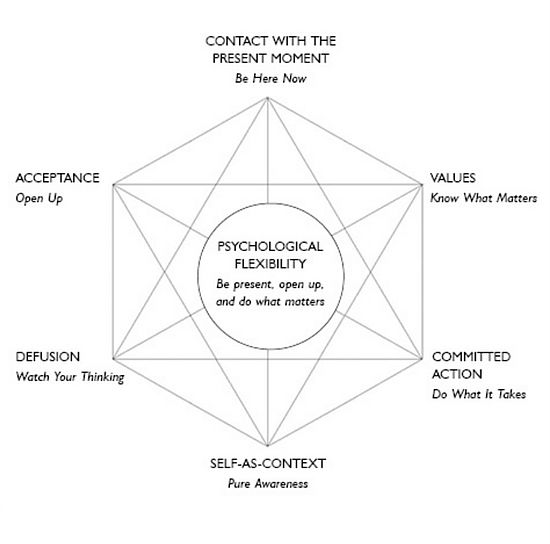«Psy-Flex»
The Psy-Flex is a self-report questionnaire designed to measure all six facets of psychological flexibility. Its main features include:
- Brevity (6 items)
- Context sensitivity
- Treatment sensitivity
- Excellent validity
- Simple language
- Numerous translations
The Psy-Flex Questionnaire is based on the assumption that there are natural variations in the need and importance of applying psychological flexibility in everyday life.
Recent contextual behavioral research also concludes that context-sensitive measurement methods are better suited to detect treatment-related changes (better treatment sensitivity). The Psy-Flex is furthermore ideal for repeated measurements (e.g., assessment at each session; event sampling, etc.) due to its brevity.
Additional translations are available in a variety of languages.
Psychological flexibility (PF) refers on the one hand to the ability to be aware of and open to internal and external stimuli. On the other hand, it includes the ability to act in accordance with personal values. In simplified terms, this means that psychological flexibility is the ability to be open in the present and to do what deeply matters to oneself.
Psychological flexibility is also a central component of Acceptance and Commitment Therapy (ACT). In this context, psychological flexibility can also be understood as a common factor of the six core competencies of ACT:
- Present moment awareness (being here and now)
- Acceptance (opening oneself within and without)
- Defusion (letting your thoughts be)
- Self-as-context (perceiving a resting pole within oneself)
- Values (know what really matters to you)
- Commitment (committed action according to one's own values)
Psychological flexibility is increasingly being studied in different contexts. Many studies conclude that psychological flexibility is an important determinant of mental health. Therefore, appropriate measurement methods should, ideally, be able to capture it in clinical and non-clinical samples.
For feedback on the translations, please contact the translators directly. If you would like to create a translation for a language that is not currently listed or if you are interested in a research collaboration, please feel free to contact us.
| Version | Contact person(s) | Validated |
|---|---|---|
| Please click on the preferred language to download the questionnaire. | ||
| Chinese (简体中文版) | C. Y. Y. Chong | – |
| Chinese (繁體中文版) | C. Y. Y. Chong | – |
| Crnogorski | I. Ivanovic | – |
| German | A. T. Gloster | yes |
| English | A. T. Gloster | yes |
| Español | F. Ruiz | – |
| Français | J-L. Monestès | – |
| Greek (Ελληνικά) | M. Karekla & A. Kassianos | yes |
| Hebrew (עִבְרִית) | D. Mouadeb | – |
| Italiano | G. Presti | – |
| Korean (한국어) | D. Jo | – |
| Magyar | D. Őri | – |
| Nederlands | T. Van Daele | – |
| Latviešu | J. Lubenko | – |
| Polski | B. Kleszcz | – |
| Português | D. M. Dias Neto & A. Nunes da Silva | – |
| Română | A. Baban | – |
| Slovenščina | D. Gosar | – |
| Suomi | R. Lappalainen | – |
| Svenska | D. Nilsson | – |
| Türkçe | G. Aydın | – |
Listed below are all validation studies of which we are aware. If you are planning to conduct a validation study, please let us know.
| Language(s) | Validation study | Status |
|---|---|---|
| Original | Gloster AT, Block VJ, Klotsche J, et al. (2021). Psy-Flex: A contextually sensitive measure of psychological flexibility. | Gloster et al. (2021) |
| Greek (Ελληνικά) | Paraskeva-Siamata, M., Spyridou, G., Gloster, A., & Karekla, M., (2018). Psyflex: Validation of a new psychological flexibility measure in a Greek-Cypriot sample. Poster presented at the ACBS World Conference 2018. | Conference program |
| Multi-language (16) | Multi-language comparison across 16 languages: coordinated by G. Presti and G. Aydin | ongoing |
| Français | Coordinated by J-L Monestes | ongoing |


